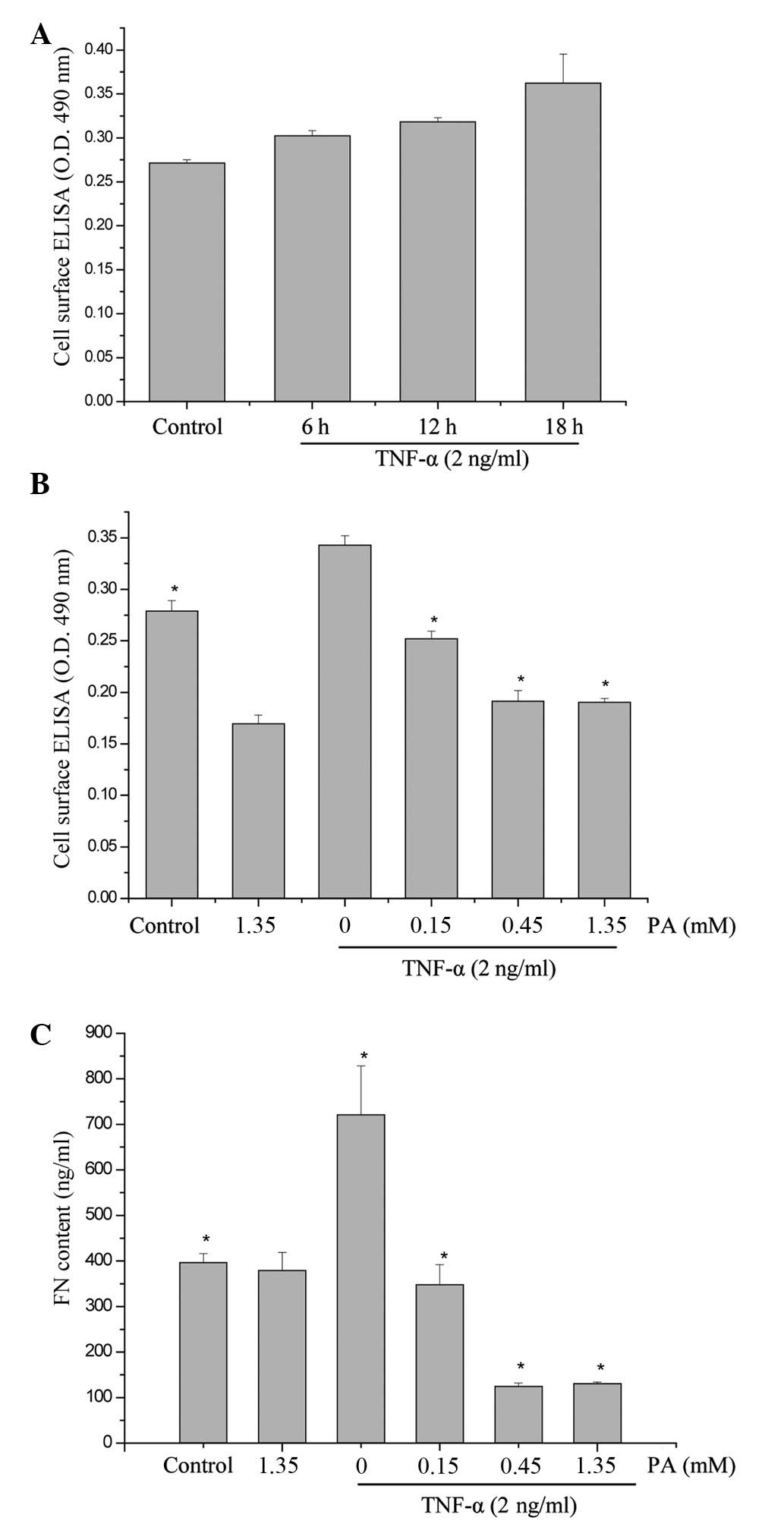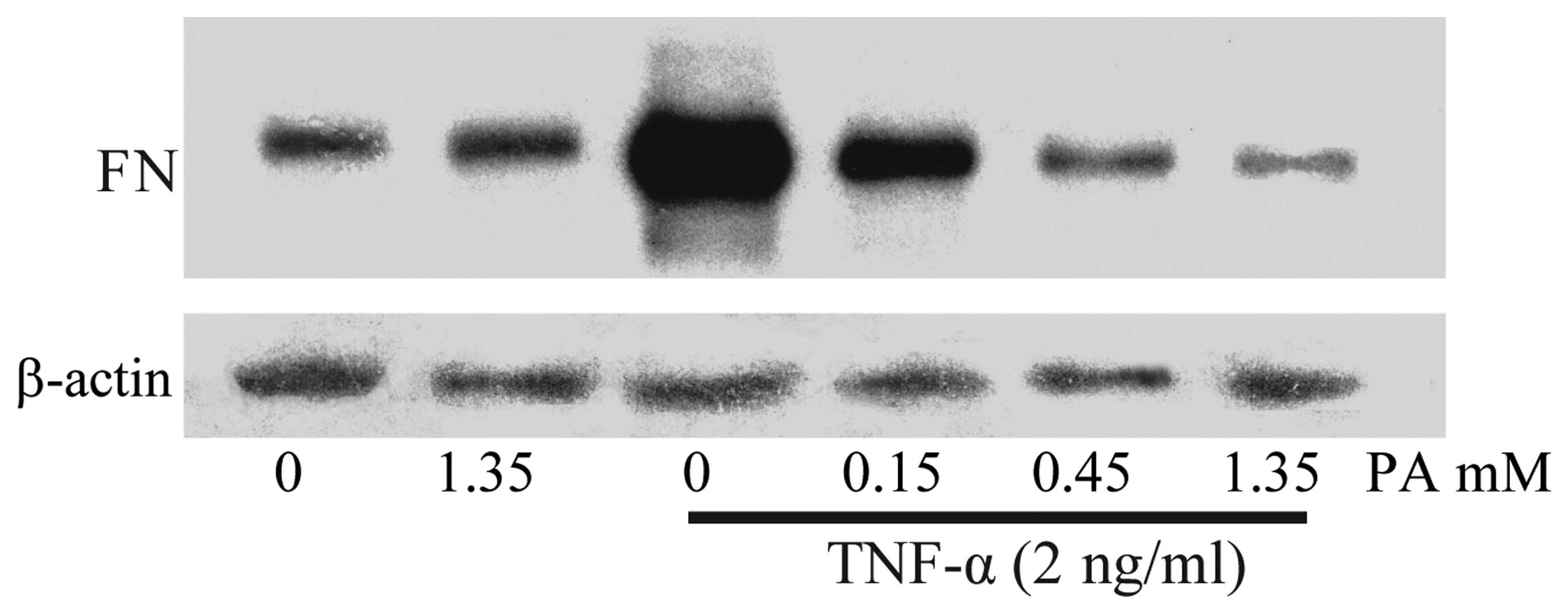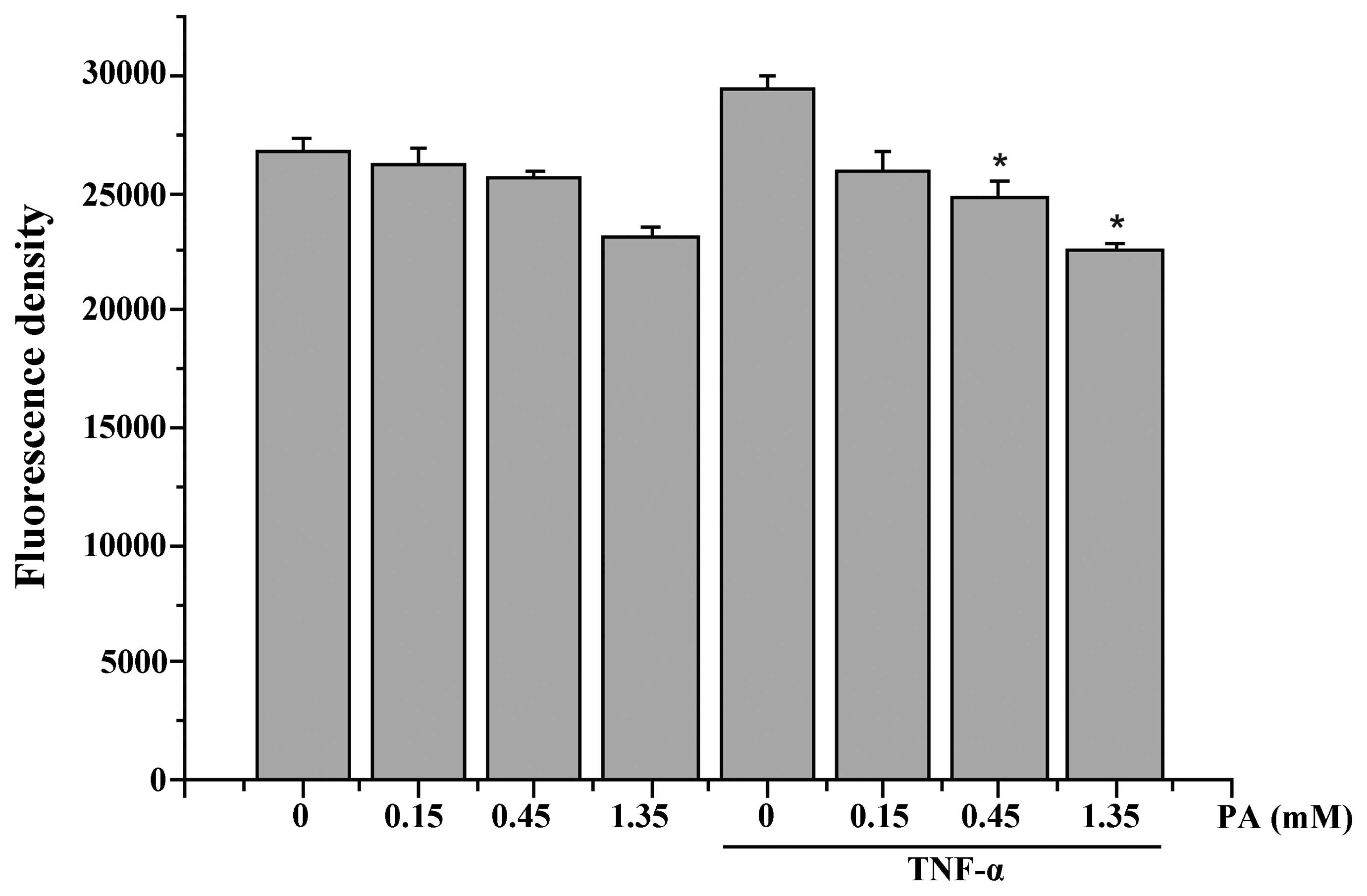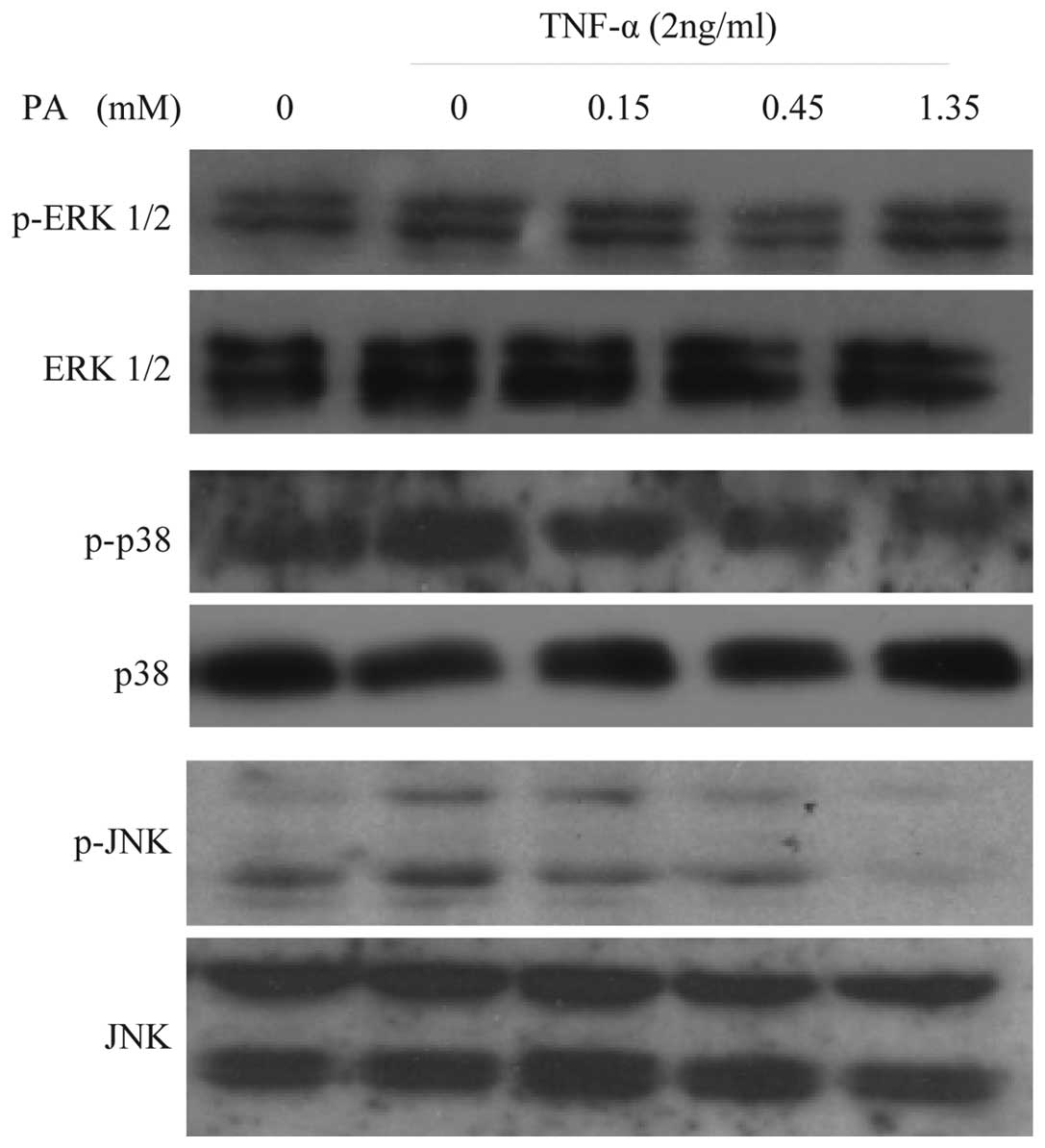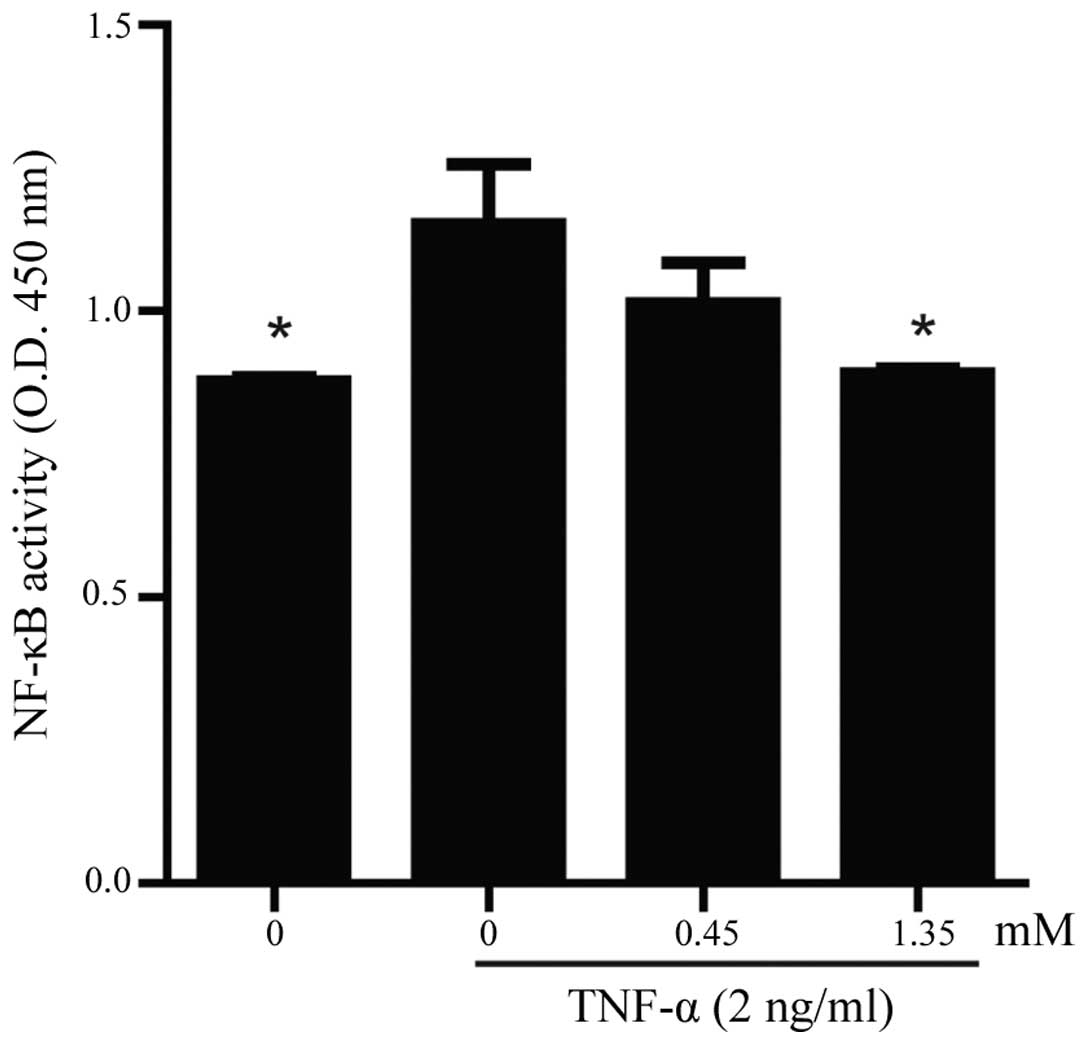|
1
|
Langheinrich AC and Bohle RM:
Atherosclerosis: Humoral and cellular factors of inflammation.
Virchows Arch. 446:101–111. 2005. View Article : Google Scholar : PubMed/NCBI
|
|
2
|
Ross R: Atherosclerosis - an inflammatory
disease. N Engl J Med. 340:115–126. 1999. View Article : Google Scholar : PubMed/NCBI
|
|
3
|
Montecucco F and Mach F: Atherosclerosis
is an inflammatory disease. Semin Immunopathol. 31:1–3. 2009.
View Article : Google Scholar : PubMed/NCBI
|
|
4
|
Ding M, Ye TX, Zhao GR, Yuan YJ and Guo
ZX: Aqueous extract of Salvia miltiorrhiza attenuates increased
endothelial permeability induced by tumor necrosis factor-alpha.
Int Immunopharmacol. 5:1641–1651. 2005. View Article : Google Scholar : PubMed/NCBI
|
|
5
|
Pellegatta F, Radaelli A, Ferrero E,
Toninelli E, Vidal MJ, Chierchia SL and Zocchi MR: Inducible nitric
oxide synthase modulates fibronectin production in the EA.hy926
cell line and cultured human umbilical vein endothelial cells. J
Cardiovasc Pharmacol. 24:1014–1019. 1994. View Article : Google Scholar : PubMed/NCBI
|
|
6
|
Modur V, Zimmerman GA, Prescott SM and
McIntyre TM: Endothelial cell inflammatory responses to tumor
necrosis factor alpha. Ceramide-dependent and -independent
mitogen-activated protein kinase cascades. J Biol Chem.
271:13094–13102. 1996. View Article : Google Scholar : PubMed/NCBI
|
|
7
|
Yoon JJ, Lee YJ, Park OJ, Lee SM, Lee YP,
Cho NG, Kang DG and Lee HS: Doinseunggitang ameliorates endothelial
dysfunction in diabetic atherosclerosis. Evid Based Complement
Alternat Med. 2013:7835762013. View Article : Google Scholar : PubMed/NCBI
|
|
8
|
Yin Y, Wan J, Li P, Jia Y, Sun R, Pan G
and Wan G: Protective effect of Xin Mai Jia ultrafiltration extract
on human umbilical vein endothelial cell injury induced by hydrogen
peroxide and the effect on the NO-cGMP signaling pathway. Exp Ther
Med. 8:38–48. 2014.PubMed/NCBI
|
|
9
|
Rohwedder I, Montanez E, Beckman K,
Bengtsson E, Dunér P, Nilsson J, Soehnlein O and Fässler R: Plasma
fibronectin deficiency impedes atherosclerosis progression and
fibrous cap formation. EMBO Mol Med. 4:564–576. 2012. View Article : Google Scholar : PubMed/NCBI
|
|
10
|
Erickson HP: Strethching fibronectin. J
Muscle Res Cell Motil. 23:575–580. 2002. View Article : Google Scholar : PubMed/NCBI
|
|
11
|
Madri JA, Pratt BM and Yannariello-Brown
J: Matrix-driven cell size change modulates aortic endothelial cell
proliferation and sheet migration. Am J Pathol. 132:18–27.
1988.PubMed/NCBI
|
|
12
|
Alexander RW: Theodore cooper memorial
lecture. Hypertension and the pathogenesis of atherosclerosis.
Oxidative stress and the mediation of arterial inflammatory
response: A new perspective. Hypertension. 25:155–161. 1995.
View Article : Google Scholar : PubMed/NCBI
|
|
13
|
Patel RP, Moellering D, Murphy-Ullrich J,
Jo H, Beckman JS and Darley-Usmar VM: Cell signaling by reactive
nitrogen and oxygen species in atherosclerosis. Free Radic Biol
Med. 28:1780–1794. 2000. View Article : Google Scholar : PubMed/NCBI
|
|
14
|
Griendling KK, Sorescu D and Ushio-Fukai
M: NAD(P)H oxidase: Role in cardiovascular biology and disease.
Circ Res. 86:494–501. 2000. View Article : Google Scholar : PubMed/NCBI
|
|
15
|
Zheng CS, Xu XJ, Ye HZ, Wu GW, Xu HF, Li
XH, Huang SP and Liu XX: Computational pharmacological comparison
of Salvia miltiorrhiza and Panax notoginseng used in the
therapy of cardiovascular diseases. Exp Ther Med. 6:1163–1168.
2013.PubMed/NCBI
|
|
16
|
Chen YH, Lin SJ, Ku HH, Shiao MS, Lin FY,
Chen JW and Chen YL: Salvianolic acid B attenuates VCAM-1 and
ICAM-1 expression in TNF-alpha-treated human aortic endothelial
cells. J Cell Biochem. 82:512–521. 2001. View Article : Google Scholar : PubMed/NCBI
|
|
17
|
Chen YL, Yang SP, Shiao MS, Chen JW and
Lin SJ: Salvia miltiorrhiza inhibits intimal hyperplasia and
monocyte chemotactic protein-1 expression after balloon injury in
cholesterol-fed rabbits. J Cell Biochem. 83:484–493. 2001.
View Article : Google Scholar : PubMed/NCBI
|
|
18
|
Zhou Z, Wang SQ, Liu Y and Miao AD:
Cryptotanshinone inhibits endothelin-1 expression and stimulates
nitric oxide production in human vascular endothelial cells.
Biochim Biophys Acta. 1760:1–9. 2006. View Article : Google Scholar : PubMed/NCBI
|
|
19
|
Zhou Z, Liu Y, Miao AD and Wang SQ:
Salvianolic acid B attenuates plasminogen activator inhibitor type
1 production in TNF-alpha treated human umbilical vein endothelial
cells. J Cell Biochem. 96:109–116. 2005. View Article : Google Scholar : PubMed/NCBI
|
|
20
|
Zhou Z, Liu Y, Miao AD and Wang SQ:
Protocatechuic aldehyde suppresses TNF-alpha-induced ICAM-1 and
VCAM-1 expression in human umbilical vein endothelial cells. Eur J
Pharmacol. 513:1–8. 2005. View Article : Google Scholar : PubMed/NCBI
|
|
21
|
Zeng Y, Song JX and Shen XC: Herbal
remedies supply a novel prospect for the treatment of
atherosclerosis: A review of current mechanism studies. Phytother
Res. 26:159–167. 2012. View
Article : Google Scholar : PubMed/NCBI
|
|
22
|
Lin TH and Hsieh CL: Pharmacological
effects of Salvia miltiorrhiza (Danshen) on cerebral
infarction. Chin Med. 5:222010. View Article : Google Scholar : PubMed/NCBI
|
|
23
|
Wu WY and Wang YP: Pharmacological actions
and therapeutic applications of Salvia miltiorrhiza depside
salt and its active components. Acta Pharmacol Sin. 33:1119–1130.
2012. View Article : Google Scholar : PubMed/NCBI
|
|
24
|
Faggiotto A and Ross R: Studies of
hypercholesterolemia in the nonhuman primate. II. Fatty streak
conversion to fibrous plaque. Arteriosclerosis. 4:341–356. 1984.
View Article : Google Scholar : PubMed/NCBI
|
|
25
|
Potts JR and Campbell ID: Structure and
function of fibronectin modules. Matrix Biol. 15:313–321. 1996.
View Article : Google Scholar : PubMed/NCBI
|
|
26
|
Sechler JL, Corbett SA, Wenk MB and
Schwarzbauer JE: Modulation of cell-extracellular matrix
interactions. Ann NY Acad Sci. 857:143–154. 1998. View Article : Google Scholar : PubMed/NCBI
|
|
27
|
Orr AW, Sanders JM, Bevard M, Coleman E,
Sarembock IJ and Schwartz MA: The subendothelial extracellular
matrix modulates NF-kappaB activation by flow: A potential role in
atherosclerosis. J Cell Biol. 169:191–202. 2005. View Article : Google Scholar : PubMed/NCBI
|
|
28
|
Kosmehl H, Berndt A and Katenkamp D:
Molecular variants of fibronectin and laminin: Structure,
physiological occurrence and histopathological aspects. Virchows
Arch. 429:311–322. 1996. View Article : Google Scholar : PubMed/NCBI
|
|
29
|
Powers RW, Majors AK, Cerula SL, Huber HA,
Schmidt BP and Roberts JM: Changes in markers of vascular injury in
response to transient hyperhomocysteinemia. Metabolism. 52:501–507.
2003. View Article : Google Scholar : PubMed/NCBI
|
|
30
|
Mann GE, Bonacasa B, Ishii T and Siow RC:
Targeting the redox sensitive Nrf2-Keap1 defense pathway in
cardiovascular disease: Protection afforded by dietary isoflavones.
Curr Opin Pharmacol. 9:139–145. 2009. View Article : Google Scholar : PubMed/NCBI
|
|
31
|
Genestra M: Oxyl radicals, redox-sensitive
signalling cascades and antioxidants. Cell Signal. 19:1807–1819.
2007. View Article : Google Scholar : PubMed/NCBI
|
|
32
|
Lee HB, Yu MR, Song JS and Ha H: Reactive
oxygen species amplify protein kinase C signaling in high
glucose-induced fibronectin expression by human peritoneal
mesothelial cells. Kidney Int. 65:1170–1179. 2004. View Article : Google Scholar : PubMed/NCBI
|
|
33
|
Liu ZG: Molecular mechanism of TNF
signaling and beyond. Cell Res. 15:24–27. 2005. View Article : Google Scholar : PubMed/NCBI
|
|
34
|
Baeuerle PA and Baltimore D: NF-kappaB:
Ten years after. Cell. 87:13–20. 1996. View Article : Google Scholar : PubMed/NCBI
|
|
35
|
Ip YT and Davis RJ: Signal transduction by
the c-Jun N-terminal kinase (JNK)-from inflammation to development.
Curr Opin Cell Biol. 10:205–219. 1998. View Article : Google Scholar : PubMed/NCBI
|
|
36
|
Jones WK, Brown M, Wilhide M, He S and Ren
X: NF-kappaB in cardiovascular disease: Diverse and specific
effects of a ‘general’ transcription factor? Cardiovasc Toxicol.
5:183–202. 2005. View Article : Google Scholar : PubMed/NCBI
|















